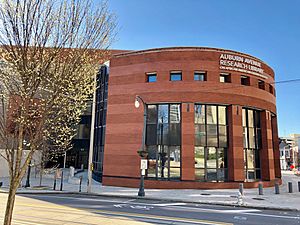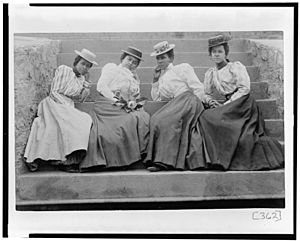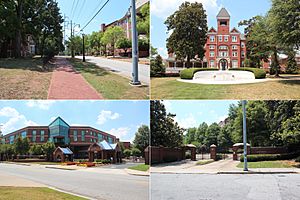African Americans in Atlanta facts for kids
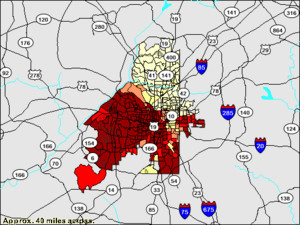
Dark red indicates that the area is over 90% African American.
|
|
| Total population | |
|---|---|
| 2,004,889 | |
| Regions with significant populations | |
| Throughout Atlanta and its suburbs | |
| Languages | |
| Southern American English, African-American English | |
| Religion | |
| Historically Black Protestant, Irreligion |
Atlanta is famous for its strong black community. It is known for black wealth, great colleges, political power, and culture. Atlanta is also where the Civil Rights Movement grew, and it was the home of Martin Luther King Jr.. People often call Atlanta a "black mecca" because of this. Many people from Africa and the Caribbean also live in Atlanta. More and more of Atlanta's black population are people born in other countries.
Contents
- Demographics: Understanding Atlanta's Population Changes
- Political Power: Black Leadership in Atlanta
- Higher Education: Atlanta's Role in Black Intellectualism
- Upper Class: Atlanta's Influential Black Community
- Black Mecca: A City of Opportunity
- Culture and Recreation: Atlanta's Vibrant Black Scene
- History: African Americans in Atlanta's Past
- See Also
- Images for kids
Demographics: Understanding Atlanta's Population Changes
Atlanta's population has changed over time. Here's how the black population looked in 2000 and 2010:
| Pop. 2010 | % of total 2010 | Pop. 2000 | % of total 2000 | absolute change 2000-2010 |
% change 2000-2010 |
|---|---|---|---|---|---|
| 226,894 | 54.0% | 255,689 | 61.4% | -31,678 | -12.3% |
Between 2000 and 2010, the number of black residents in the city of Atlanta went down. However, the overall Metro Atlanta saw a big increase in its black population.
Neighborhood Shifts in Atlanta
Some neighborhoods in Atlanta saw a decrease in their black population:
- In areas like East Atlanta and Grant Park, the black population went from 57.6% to 38.0%.
- In Edgewood and Kirkwood, it changed from 86.2% to 58.7%.
- In English Avenue and Vine City, the black population went from 97.5% to 89.1%.
Other areas saw an increase in their black population:
- In the Metropolitan Parkway area, the black population grew from 59.5% to 83.2%.
- Central Buckhead became more diverse, with the black population rising from 5.9% to 12.3%.
Black Population Growth in Metro Atlanta
In Metro Atlanta, Black Americans are the largest minority group. They make up 32.4% of the population, up from 28.9% in 2000. Many black residents moved from the city of Atlanta and DeKalb County to other parts of the metro area.
More than 500,000 African Americans settled in other counties. This included Gwinnett, Fulton (outside Atlanta), Cobb, Clayton, Douglas, Newton, and Rockdale Counties.
Here's how the black population changed in Atlanta and DeKalb County compared to the whole metro area:
| Year | Black pop. in City of Atlanta |
Black pop. in DeKalb County |
Total black pop. Atlanta + DeKalb |
Total black pop. Metro Atlanta |
Proportion of black pop. in Atlanta + DeKalb |
|---|---|---|---|---|---|
| 2000 | 255,689 | 361,111 | 616,800 | 1,189,179 | 51.9% |
| 2010 | 226,894 | 375,697 | 602,591 | 1,707,913 | 35.2% |
From 2000 to 2010, the percentage of black residents living in Atlanta and DeKalb County decreased. This shows a spread of the black population across the wider metro area.
In 2015, Metro Atlanta gained more new black residents than any other U.S. city. Over 198,031 black residents moved there.
Diverse Black Communities in Atlanta
Atlanta is home to many different black communities. There is a black Jamaican community, especially in Stone Mountain, Decatur, Lithonia, and Snellville. There is also a black Haitian community.
Many African-born black residents in Atlanta come from countries like Eritrea, Ethiopia, Ghana, Somalia, Liberia, and Nigeria.
Political Power: Black Leadership in Atlanta
In 1870, William Finch and George Graham made history. They were the first African Americans elected to the Atlanta Board of Aldermen. This is now called the Atlanta City Council.
Since 1973, Atlanta has always elected black mayors. Two famous mayors were Andrew Young and Maynard Jackson. These leaders worked with the business community to help Atlanta grow. They also supported black-owned businesses and neighborhood groups. This partnership has helped Atlanta become a "world-class city."
Recent Political Milestones
In May 2018, Stacey Abrams became the first black woman to win a major party nomination for governor in the United States. She ran for governor of Georgia.
In January 2021, Raphael Warnock became the first black U.S. senator elected in Georgia. He was also the first black U.S. Democratic senator elected in the South.
Higher Education: Atlanta's Role in Black Intellectualism
Atlanta is home to the Atlanta University Center (AUC). This is the oldest and largest group of historically-black colleges in one area. It includes Clark Atlanta University, Morehouse College, Spelman College, Morehouse School of Medicine, and Interdenominational Theological Center. These colleges started after the Civil War. They have made Atlanta a key place for black thinkers and leaders.
Many successful African Americans have studied at the AUC. For example, you can see lists of famous alumni from Morehouse College, Clark Atlanta University, and Spelman College.
Other Important Colleges in Atlanta
Morris Brown College was the first college in Georgia started by African Americans. Atlanta Metropolitan State College is also mostly black.
Clayton State University (CSU) became mostly black in the mid-2000s. In 2021, CSU appointed its first black president. Georgia Gwinnett College has also been mostly black since the late-2010s.
Atlanta's John Marshall Law School became Georgia's only mostly black law school in the mid-2010s. In 2020, it hired its first black dean.
Emory University has one of the oldest African-American studies departments in the country. The Georgia Institute of Technology is known for producing many black engineers.
Georgia State University (GSU) is the largest university in Georgia. Since the 2010s, it has been mostly black. GSU produces the most black college graduates with bachelor's degrees each year. In 2021, GSU appointed its first black president.
Upper Class: Atlanta's Influential Black Community
Atlanta has a strong black upper class. These leaders are important in politics, business, and education. Historically, they were also important in religious life. Mayors Maynard Jackson and Andrew Young came from this group.
Atlanta is home to the nation's largest black-owned insurance company (Atlanta Life). It also has a major real estate firm (H.J. Russell) and top black-owned investment and law firms. Many of these leaders graduated from AUC schools.
Why Atlanta's Black Elite Grew
Several reasons explain why a black elite grew in Atlanta:
- Black colleges were started early after the Civil War. Their graduates often stayed in the city and became leaders.
- Atlanta had a large black population. This created a big market for black-owned businesses and services.
- After the 1906 Atlanta race riot, black businesses moved from downtown Atlanta for safety. New laws also led to segregation. This created strong, separate black business areas like Sweet Auburn.
Today, areas like Collier Heights and Niskey Lake in southwest Atlanta are popular black elite neighborhoods. Eastern Atlanta in DeKalb County is also home to many upper-class black Americans.
Black Mecca: A City of Opportunity
A black mecca is a city that attracts African Americans, especially professionals. This happens for several reasons:
- There are good economic opportunities for black people.
- Black people have political power in the city.
- The city has leading black educational institutions.
- The city is a major center for black arts, music, and culture.
- There are good relationships between black and white people.
Atlanta has been called a black mecca since the 1970s.
Culture and Recreation: Atlanta's Vibrant Black Scene
Atlanta is known as a top city for African-American culture. It has great food, nightlife, music, entertainment, film, history, and art.
Festivals and Events
The National Black Arts Festival has been in Atlanta since the late 1980s. It shows performing arts, literature, and visual arts by black artists. The Atlanta Jazz Festival in Piedmont Park is one of the largest free jazz festivals. It features mostly black artists.
The A3C Festival & Conference highlights black artists, creators, and entrepreneurs. The One Musicfest is an annual Hip-Hop/R&B concert. House in the Park is a big house music festival held every Labor Day weekend.
The Sweet Auburn Springfest is a large outdoor festival in the historic Sweet Auburn district. The Sweet Auburn Music Festival is another big free outdoor music event. The Atlanta Hip Hop Day Festival celebrates Atlanta's Hip-Hop culture. Afropunk Atlanta is a fall festival with music, film, fashion, and art by black artists.
The Juneteenth Atlanta Parade & Music Festival is one of the largest Juneteenth events in the nation.
Shopping and Socializing
The New Black Wall Street opened in 2021 in Stonecrest. It is a large marketplace with over 100 black merchants and entertainment. It is inspired by the historic black business district in Tulsa, Oklahoma.
The Castleberry Hill district has the most black businesses and social spots in the nation. Edgewood Avenue also has many black-owned businesses and popular places. The Village at Ponce City Market features black entrepreneurs.
Weekend brunch is very popular in Atlanta's black culture. There are many popular black-owned brunch spots. Atlanta Black Restaurant Week celebrates black-owned restaurants.
Music and Entertainment
Atlanta is a major center for hip-hop music. Producers like Drumma Boy and Zaytoven are famous for their work there. Atlanta is also the setting for many movies and TV shows, like Real Housewives of Atlanta and Tyler Perry's series.
Tyler Perry Studios is one of the largest film studios in the nation. It is the first major studio owned by an African American.
Sports and Community Events
The Black Music & Entertainment Walk of Fame opened in 2021 near the Mercedes-Benz Stadium. The MEAC/SWAC Challenge is an annual football game between historically black colleges. The Celebration Bowl is the only HBCU football bowl game.
The annual Black College Football Hall of Fame ceremony is held in Atlanta. It honors great football players from historically black colleges. The annual Honda Battle of the Bands is the largest college marching band event in the country.
The HBCU Alumni Alliance 5K Run/Walk is a summer fundraising event. The SWAC Alumni Picnic brings together alumni from SWAC schools.
Other Cultural Highlights
Atlanta has many black-centric street art and murals. The Cascade Skating Rink is a popular black-owned roller rink. It was featured in the movie ATL (film).
The UniverSoul Circus is the nation's only black-owned traveling circus. It was founded and is based in Atlanta.
Atlanta has many black-owned bookstores. It is a top place for readers of African-American literature. The annual Spelman College-Morehouse College joint homecoming week, "SpelHouse Homecoming," attracts many visitors.
The Atlanta Black Pride celebration is the largest in the world for black LGBT people.
Museums: Exploring Black History and Culture
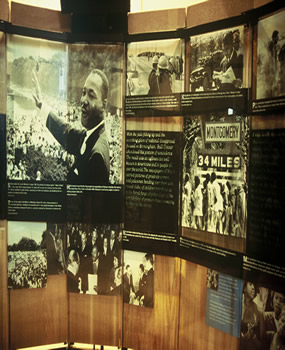
Atlanta has many museums about black history, art, and culture. Only New York City has more. Many are in the Sweet Auburn area, which was once called "the richest Negro street in the world." Others are near the Atlanta University Center campus or in West End.
- The Martin Luther King Jr. National Historical Park has a museum about the Civil Rights Movement. You can also see Dr. King's childhood home, his church, and his burial place.
- Herndon Home is the mansion of Alonzo Herndon. He was born into slavery but became Atlanta's first black millionaire.
- Hammonds House Museum shows African American fine art.
- The Spelman College Museum of Fine Art focuses on art by and about women of the African diaspora.
- The Art Museum at Clark Atlanta University highlights art by people of the African diaspora.
- The Madame CJ Walker Museum was an original Madame CJ Walker Beauty Shoppe.
- The Trap Museum shows the history of Trap music culture.
- The National Center for Civil and Human Rights is near Centennial Olympic Park.
History: African Americans in Atlanta's Past
| Seal of the City of Atlanta | ||||||||||||||||||||||||||||||||||||||||||||||||||||||||||||||||||||||||||||||||||||||||||||||||||||||||||||||||||||||||||||||||||||||||||||||||||||||||||||||||
|
||||||||||||||||||||||||||||||||||||||||||||||||||||||||||||||||||||||||||||||||||||||||||||||||||||||||||||||||||||||||||||||||||||||||||||||||||||||||||||||||
Early Years and Slavery
Slavery was the main reason for early African American presence in the Atlanta area. In the 1820s, land was opened for settlement. Plantations for rice and cotton were set up. Most enslaved people were brought from major ports like Savannah and Charleston.
By 1850, the area that became Atlanta had 493 enslaved Africans and 18 free black people. The population had grown quickly because of new railroads. In the 1850s, Mary Combs and Ransom Montgomery were the first two African Americans to own property in Atlanta.
Civil War and Reconstruction Era
During the American Civil War, many enslaved Africans in Atlanta tried to escape. They often followed Union soldiers, like those with William Tecumseh Sherman during his March to the Sea.
After the war, in 1865, the Atlanta City Council promised equal protection for all. The first school for black children opened in an old church. Clark College (now Clark Atlanta University) was founded for African American students. In 1870, George Graham and William Finch became the first two African Americans elected to the City Council.
Between 1860 and 1870, Fulton County's population more than doubled. The percentage of African Americans in the county grew from 20.5% to 45.7%. Many freed people moved from farms to cities to find work and live more freely.
Jim Crow Era and Black Empowerment
After Reconstruction ended around 1877, African Americans in Atlanta faced new challenges. Laws known as Jim Crow took away their voting rights and limited their freedoms. However, a black middle class began to grow in Atlanta. They started black businesses, newspapers, and schools.
Booker T. Washington gave a famous speech in 1895. He urged black Americans to focus on building their wealth and businesses. Other leaders, like W. E. B. Du Bois, disagreed. They believed in fighting for immediate social and political rights.
Tensions grew, leading to the 1906 Atlanta race riot. This event caused many deaths and injuries. After the riot, neighborhoods became more segregated. Black people sought safety in areas like Sweet Auburn. Laws also made public places like streetcars segregated.
In 1928, the Atlanta Daily World newspaper began. It is one of the oldest African American newspapers still published. The Atlanta Black Crackers baseball team entertained fans in the 1920s to 1940s. Some players later joined Major League Baseball. Sweet Auburn became a very important black community.
Civil Rights Movement and Modern Era
The Civil Rights Movement brought more political power to African Americans. Since 1973, Atlanta has had black mayors, starting with Maynard Jackson. The city council has also been mostly black for a long time.
In 2018, Stacey Abrams made history. She was the first black woman to win a major party nomination for governor in the U.S. In 2019, she became the first black woman to give an official State of the Union address.
In 2021, Raphael Warnock became the first black U.S. senator elected in Georgia. He was also the first black Democratic senator elected in the South.
See Also
- Black mecca
- African Americans in Georgia (U.S. state)
Images for kids
-
The Courage to Lead exhibit at the Visitor Center of the Martin Luther King Jr. National Historical Park.


